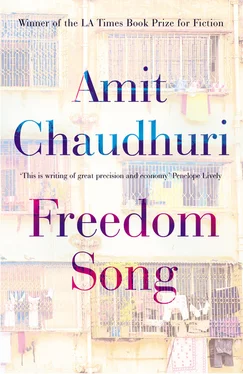‘Do you know that Sabita lives here in New Alipore?’ said Khuku, after they’d talked about her absent son for about twenty minutes. ‘I just spoke to her on the phone the other day. She’s put on a lot of weight. Hers is a sad story. Her only son is divorced.’
‘Divorced?’
‘Yes,’ said Khuku, ‘his wife left him for his own cousin. Strange things happen these days.’
‘What of Anjali?’ asked Mini, ruminating.
‘I haven’t seen her myself. I heard she lives in an ashram in the South. You know she took to wearing saffron and became a sanyasini. Apparently she still remembers me.’
‘Of course she would,’ said Mini.
In the afternoon, they’d begin discussing their school again, and their head mistress and deputy head mistress (the one who dressed strangely, because she’d been to England)—‘and the head mistress always loved me,’ said Khuku, ‘she was always throwing me out of class’—while their conversation meandered and began again. For the twenty-five years in Bombay and Delhi she’d lost touch with most of her school friends. Now, here they were, in Calcutta. And when the conversation went on for too long, and the plot grew too complex, Khuku would fall asleep. Sometimes Mini would doze off first, and Khuku would say, ‘You’re not listening!’ and she would wake up with a start, good-naturedly.
After Vidyasagar Road had curved right and moved towards the house where Ganashakti arrived for distribution, and after the small barricaded grassy triangle there was a by-lane on the left.
In this nameless thoroughfare the boys had begun to set up mikes and wiring, and often at different times of the day stealthy electronic static buzzed and disturbed the lane beneath the other noises. No one knew for certain yet that it was in this by-lane that the performance would take place. But they’d begun to make a stage.
Then a voice said, ‘Hello, hello,’ and Bhaskar’s mother heard it as she was folding a sari. However, she paid it no heed, was not even conscious of it as a separate thing.
This voice continued to say, ‘Hello, hello.’ The next day it began to say more words, too garbled to be understood from a distance: ‘Announce. . country. . a few days from now.’
Two of the men, Jodu and Pyari, had remained silent throughout, notably shy unlike the others; they had been enlisted seemingly at random from the adult literacy class; one was a carpenter and the other worked in a cement factory. They looked quite tired. ‘Everyone must take part,’ they were told; for they were all in their way ranged against one nameless enemy. ‘What do you think?’ they’d been asked; they were approached with a mixture of admonishment and cajoling. ‘Dada, will we be able to remember our lines?’ said Jodu, the more vocal of the two.
‘It’s not Tagore you have to memorize,’ admonished Bhaskar, and went on to other things.
Gradually they overcame their shyness; convinced themselves they didn’t mind at all as long as their wives weren’t there to watch them. Jodu was the short one, the one who had more confidence. He took the lead and Pyari followed. It didn’t bother them too much that they didn’t know what the play was about; these young men came one day, as if in a dream, and told them it was in a good cause, and they believed them. They told them that this letter was pronounced ‘kaw’, and this one ‘khaw’, and they repeated the letters after them.
Inside a room on the ground floor of a house, Bhaskar and his friends — Sumanta, Nikhilesh, and Mahesh — went over their lines and actions; a few others were drinking tea. Outside, someone kept saying, ‘Hello hello check one — two — three—’ while inside the flame of Socialism burned and dimmed and burned brightly again; the last of the sunlight fell on the road through a congregation of roofs and solitary antennae; a dog ran swiftly across and crickets began to sing. The proximity of the houses and the little street weighed in on them; this was their poor, true theatre. But, alas, they did not have the ability to concentrate for very long; they drifted out of the play into their own lives. Someone said, ‘Bring me some tea,’ or ‘For God’s sake, light a cigarette!’
They woke, slept, talked. They eked out the days with inconsequential chatter.
Rumours of atrocities in other cities came and went around them. Meanwhile, Nando went out to the market and came back, having pocketed a rupee and fifty paisa for himself.
Until one day Mini persuaded Khuku that she could no longer leave Shantidi by herself, and to reassure her she said, ‘As you can see I’m almost a hundred per cent better, Khuku, it’s true; I feel stronger than I have in months.’ And she gesticulated with an arm, emphatically, to convey what was an essentially incommunicable truth. She gazed at Khuku, to gauge her friend’s response from her face.
Earlier that week, she’d been to the nursing home again. By now she had become familiar with the corridor that led to Osteopathy, and the waiting-room in which she and Khuku sat until she was called in. People milled around under the signs saying Osteopathy and Radiology and Cancer Detection for apparently no purpose, coming and going until they sat down on the chairs: middle-aged women in saris, men in spectacles.
She and Khuku had grown used to its faint electric lights, its air of being cut off. And the treatment had cost Mini only thirty rupees a visit. Half an hour of the infrared had soothed her arthritis and numbed the leg into the sweetness of acceptance.
Early in the afternoon on a Tuesday they set out for Madan Chatterjee Lane, where Mini’s house was. By half-past three Mini had worn a fresh sari for the journey; folded and put her things into her bag.
Khuku was feeling drowsy because she hadn’t taken her nap. ‘I’ll make up for it in the car,’ she said. ‘I’ll doze off for twenty minutes.’ For no reason that could be clearly identified or named, Khuku felt the infinitely reticent and light touch of a sadness, something to do with journeys and roads and people, which she used to experience not infrequently when she was a girl, except that it, and life itself, was much more real then.
No sooner was she in the car than she closed her eyes. She sat in the car, her chin drooping, while the car turned near the corner of a pavement. Fifteen minutes later the noise of the traffic woke her; she said: ‘We’re still in Beckbagan!’
It took them forty-five minutes to negotiate Lower Circular Road, Chowringhee, the junction before Bentinck Street and finally to pass Mahajati Sadan and to arrive at the small lane on the left. By then, they felt like they’d come to what was probably another city. Just on the right what looked like a deep ditch had been dug in Central Avenue, where actually unfinished work for the underground had been begun and then interrupted. Although the ditch looked almost fearsome, there were in fact two children playing and rushing into it, climbing from one side to the other and disappearing again.
Narrowly the lane opened; only just enough space, like arms reluctantly parted, leaving no room for an embrace to the bosom. Yet the car moved forward into this narrow space, obstructed by handcarts and men, going more and more into the interior, towards the heart, towards a home in the heart.
Much would change in the next few months in subtle ways, but much would seem to remain unchanged. And the change was probably only a phase, a development as short-lived as anything else; while what seemed to be in a condition of stasis might actually be shimmering with uncertainty and on the brink of extinction.
Читать дальше












